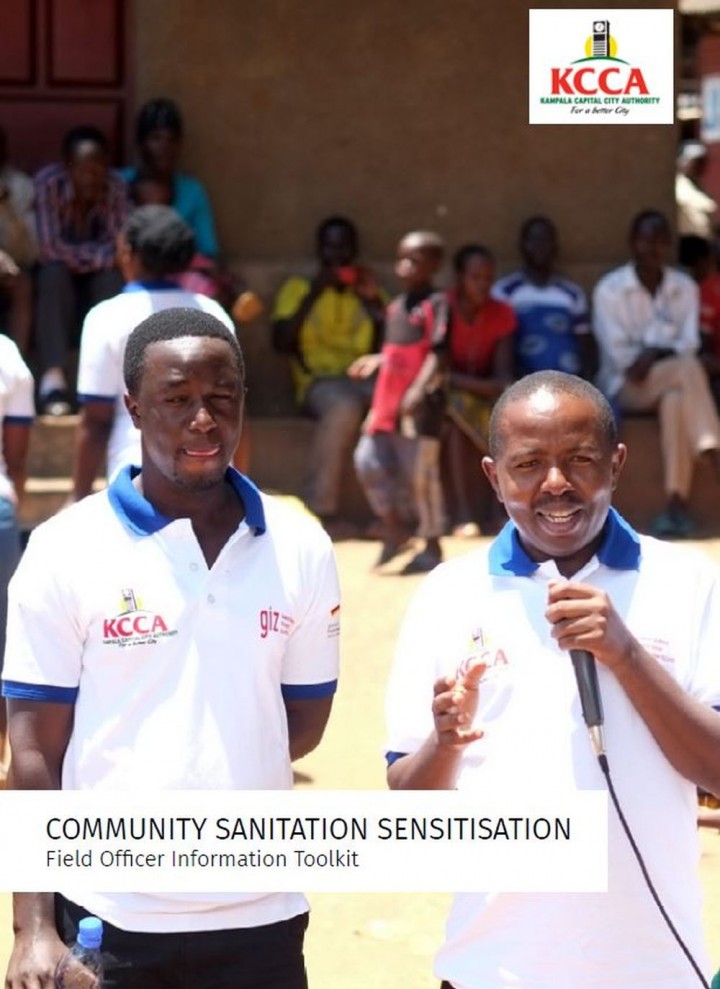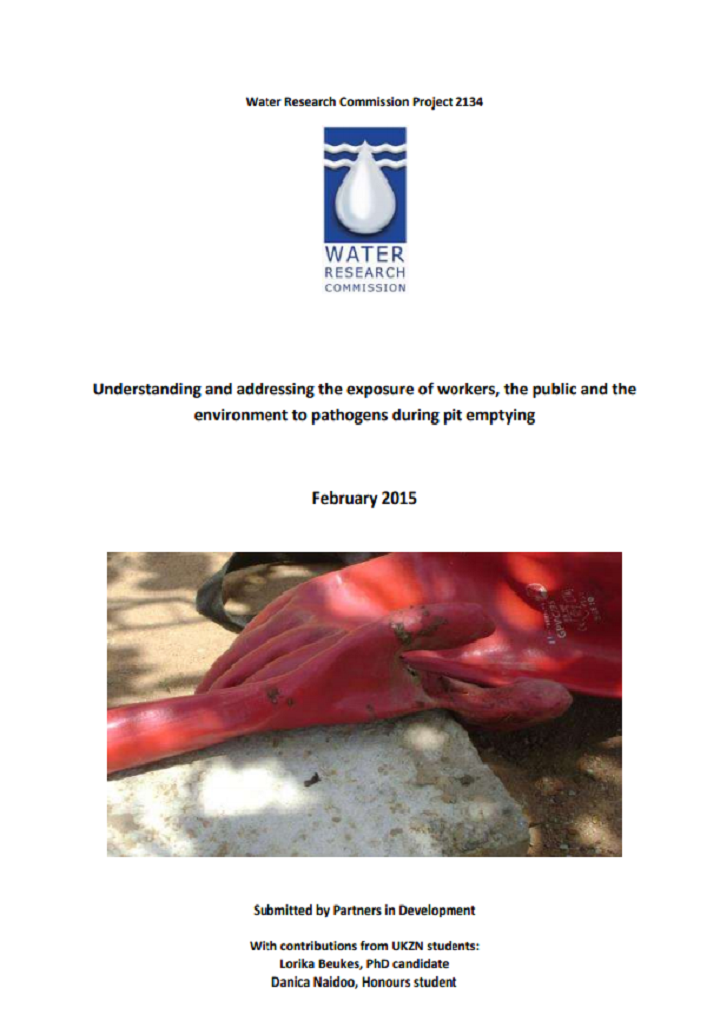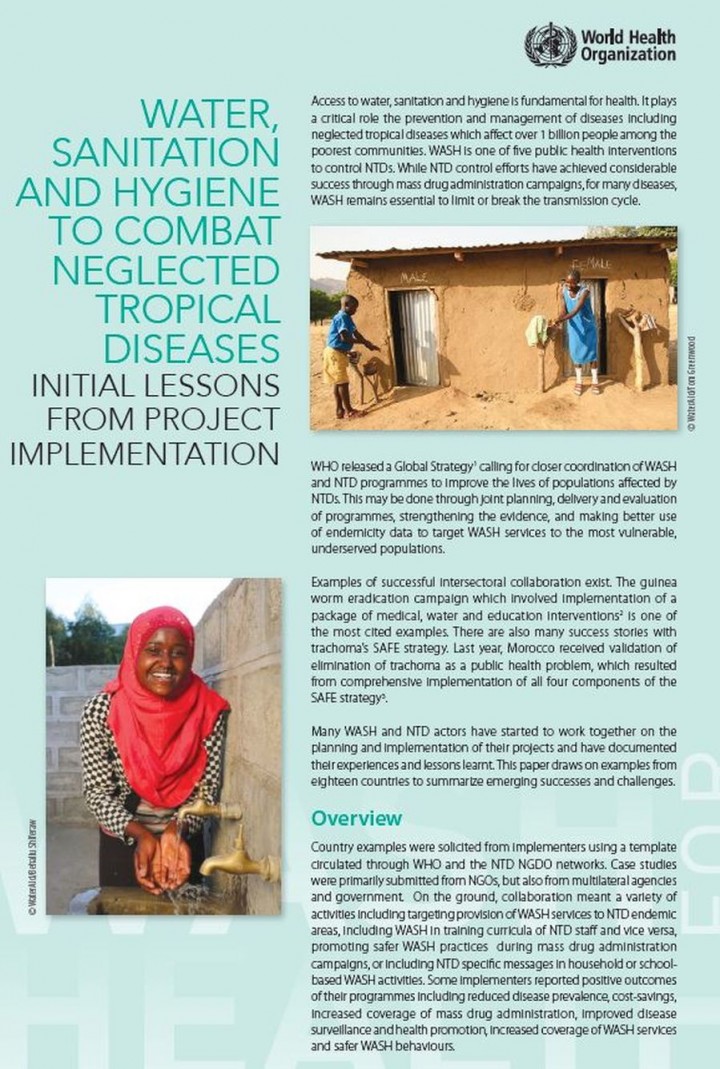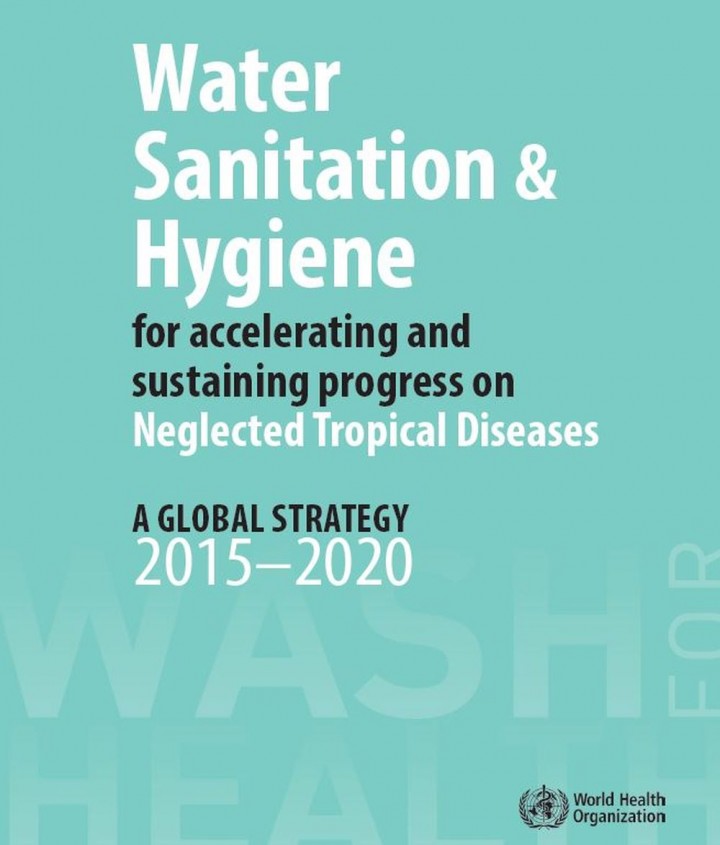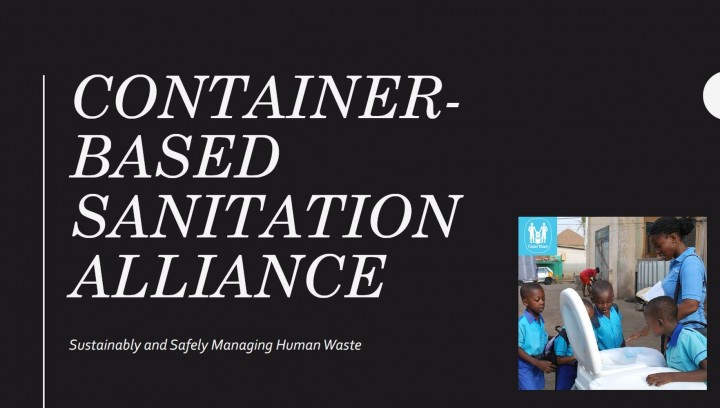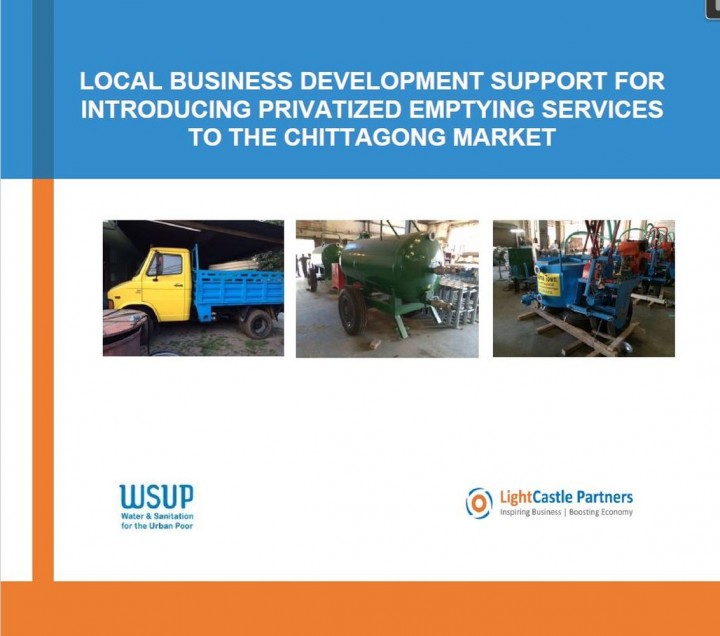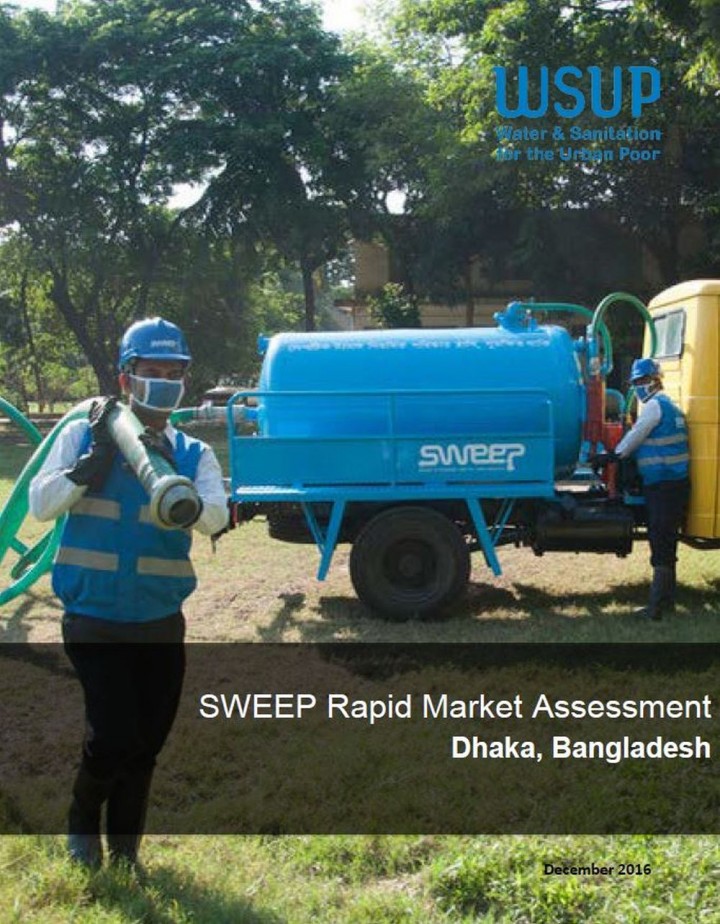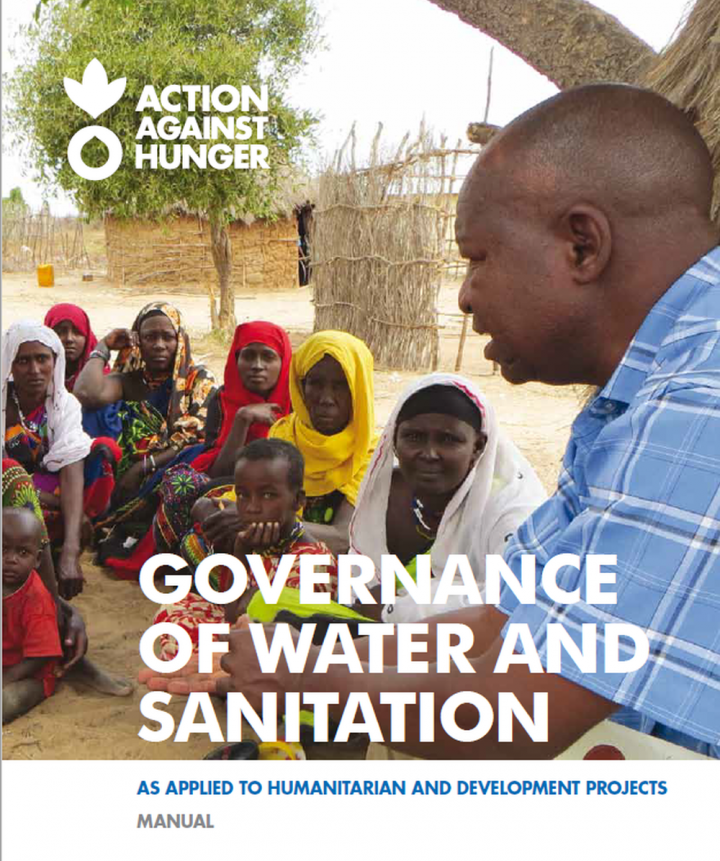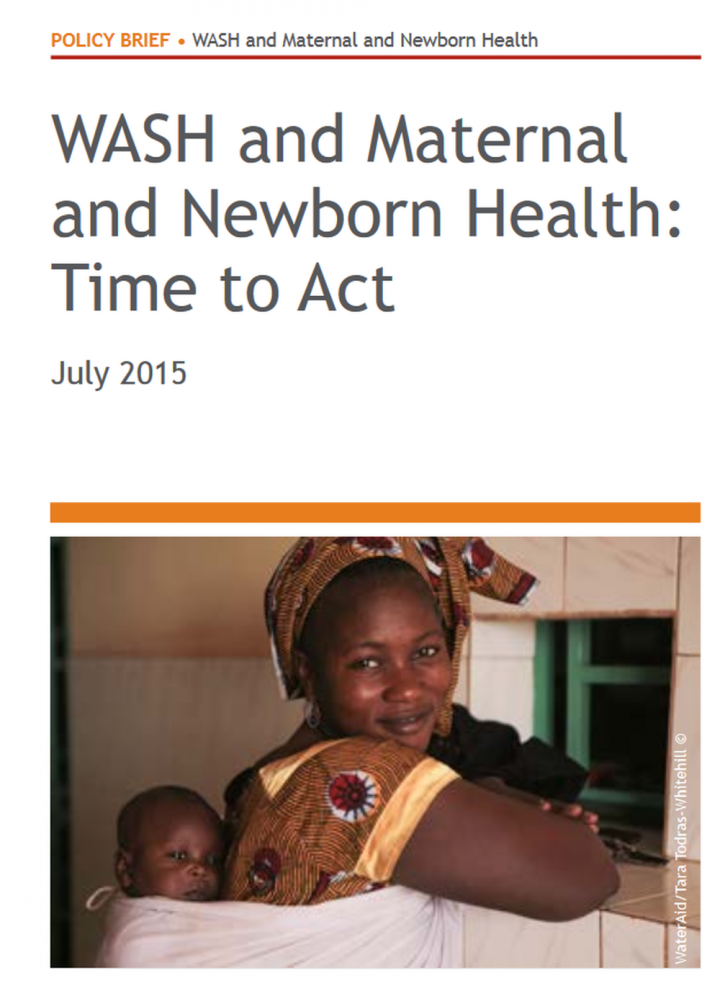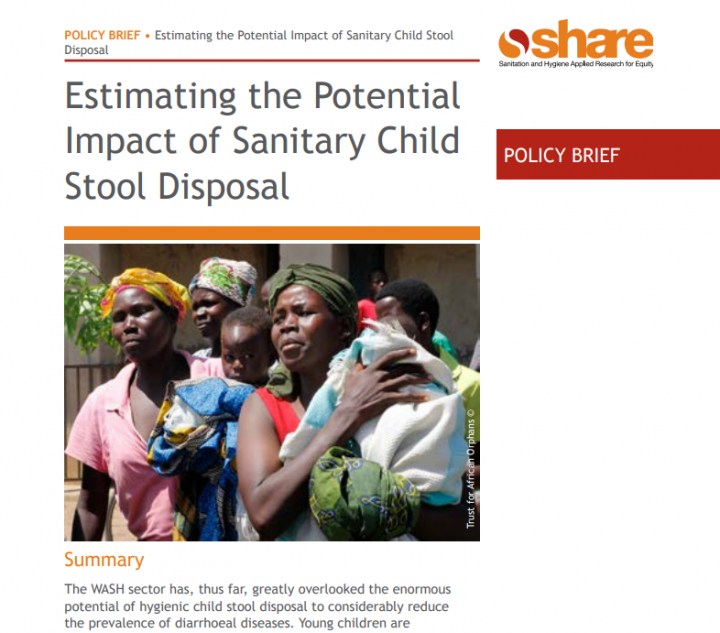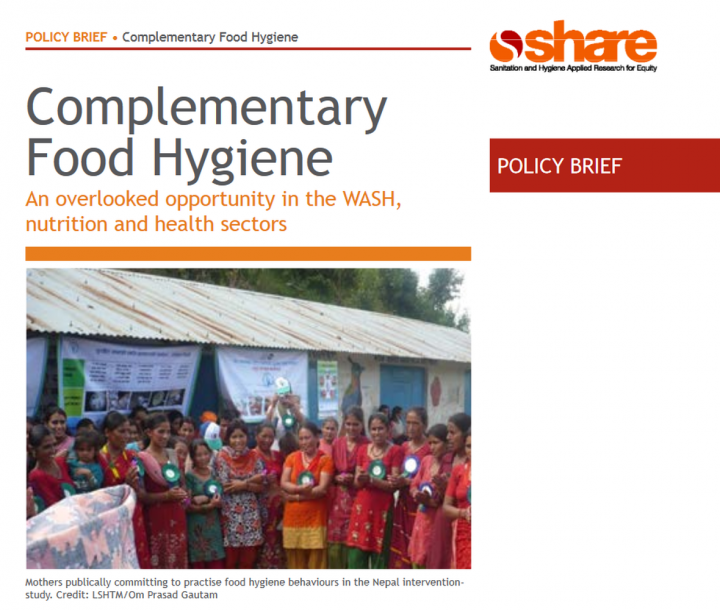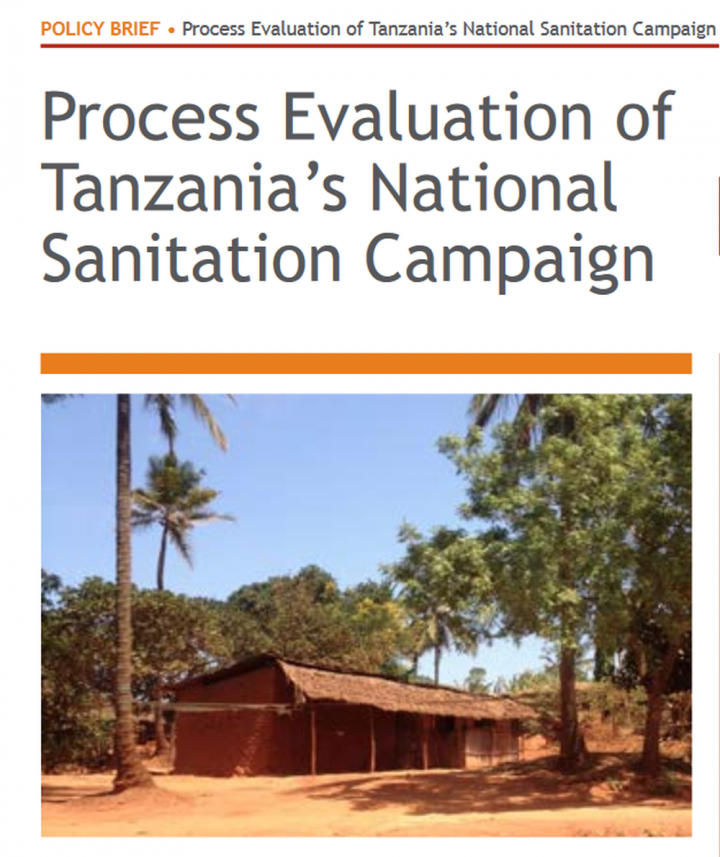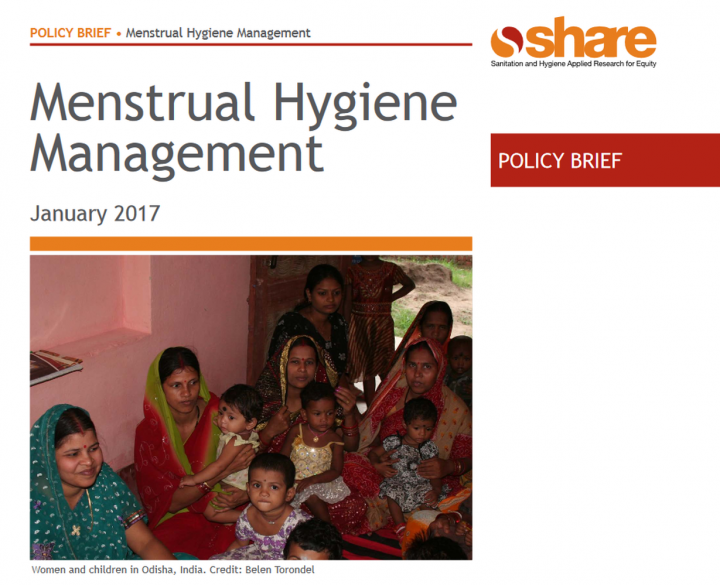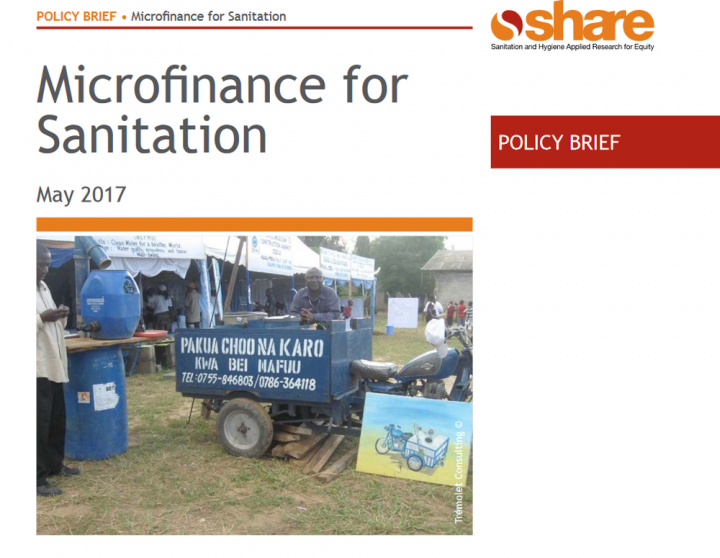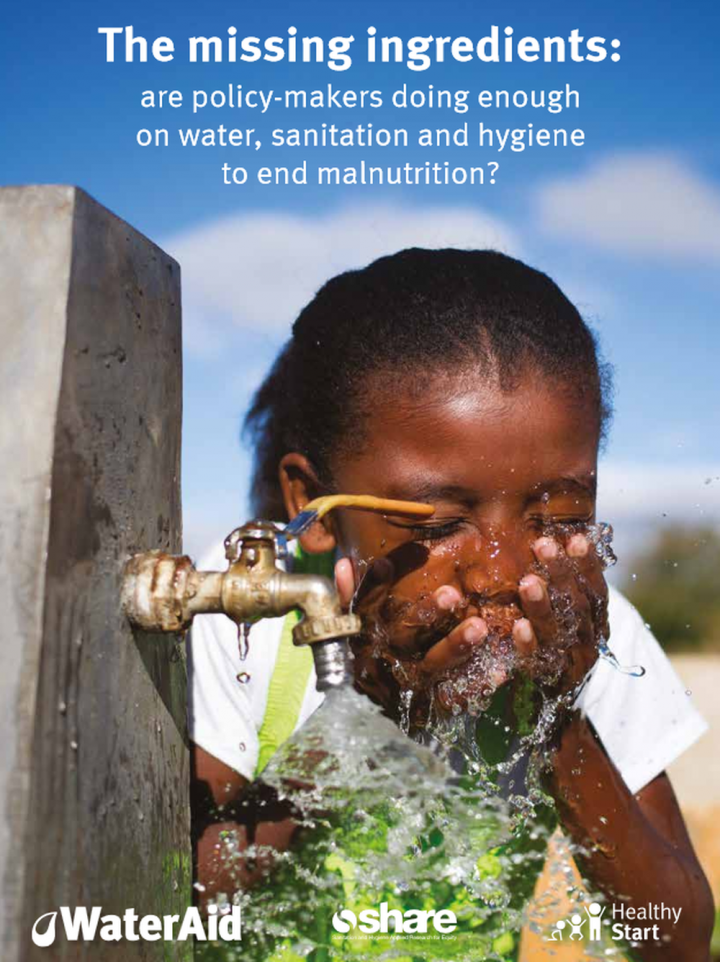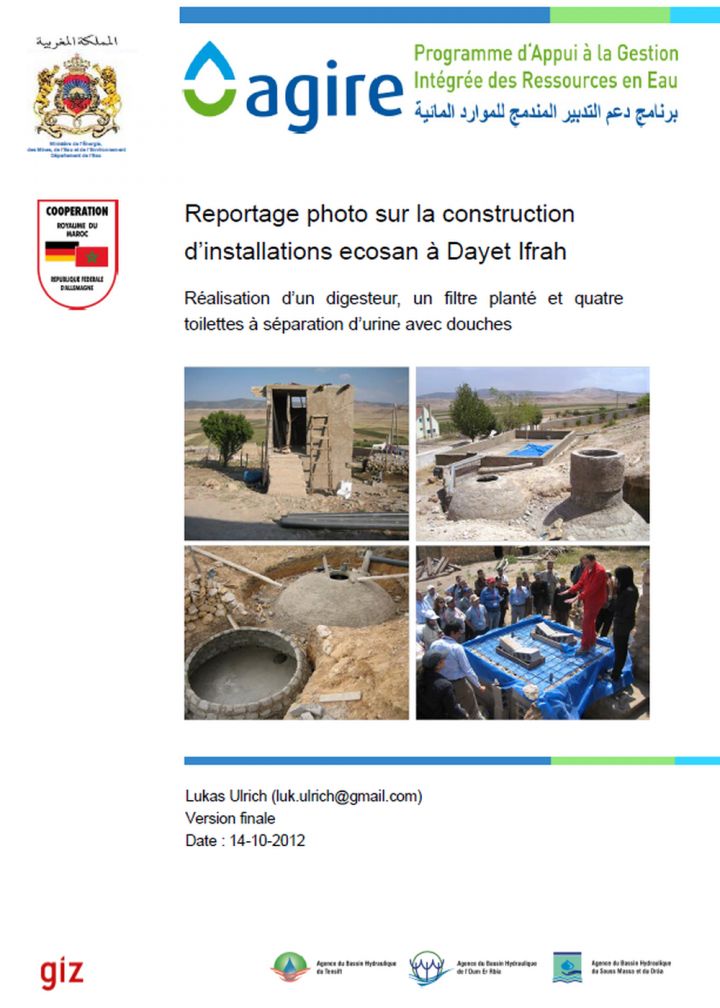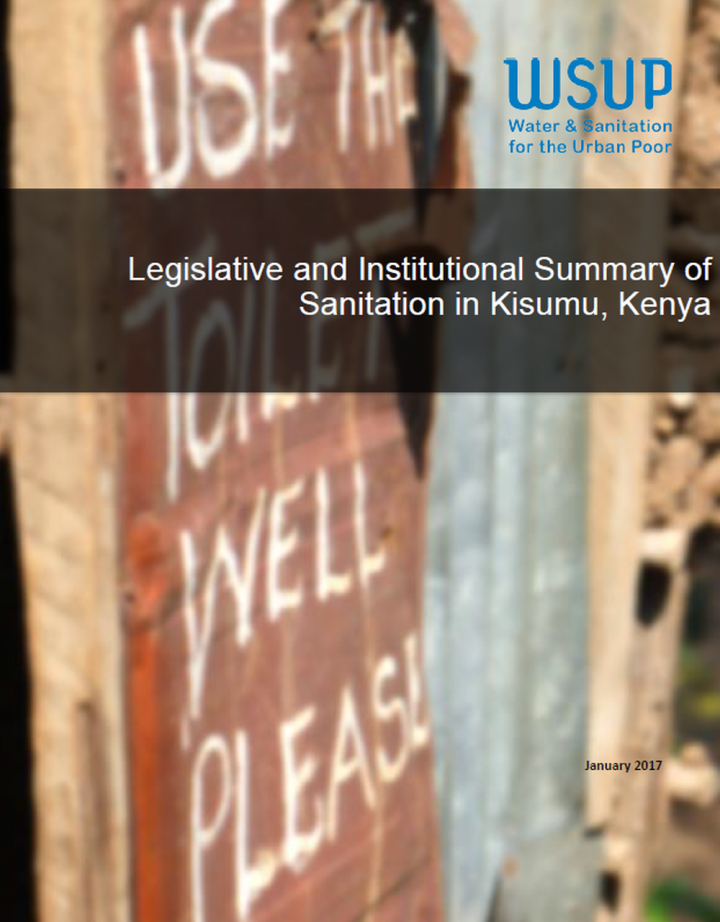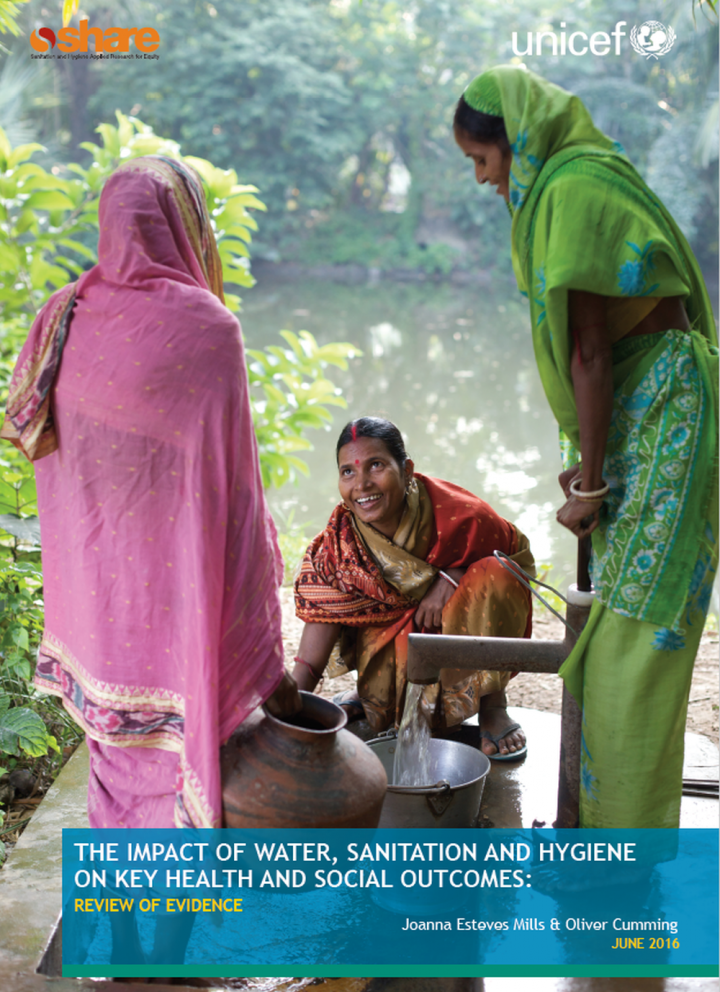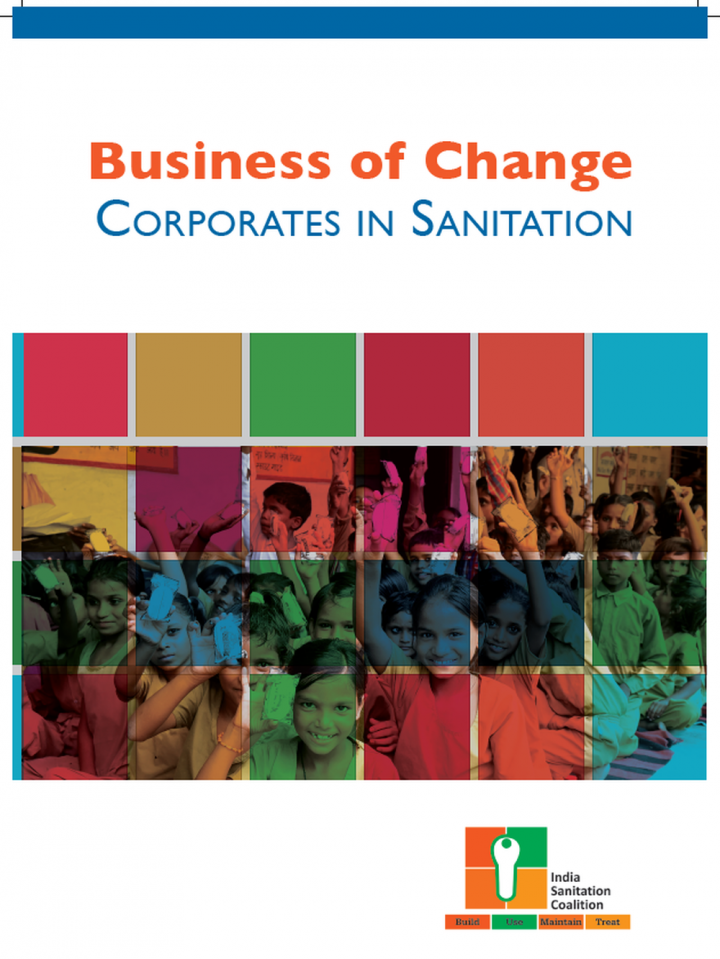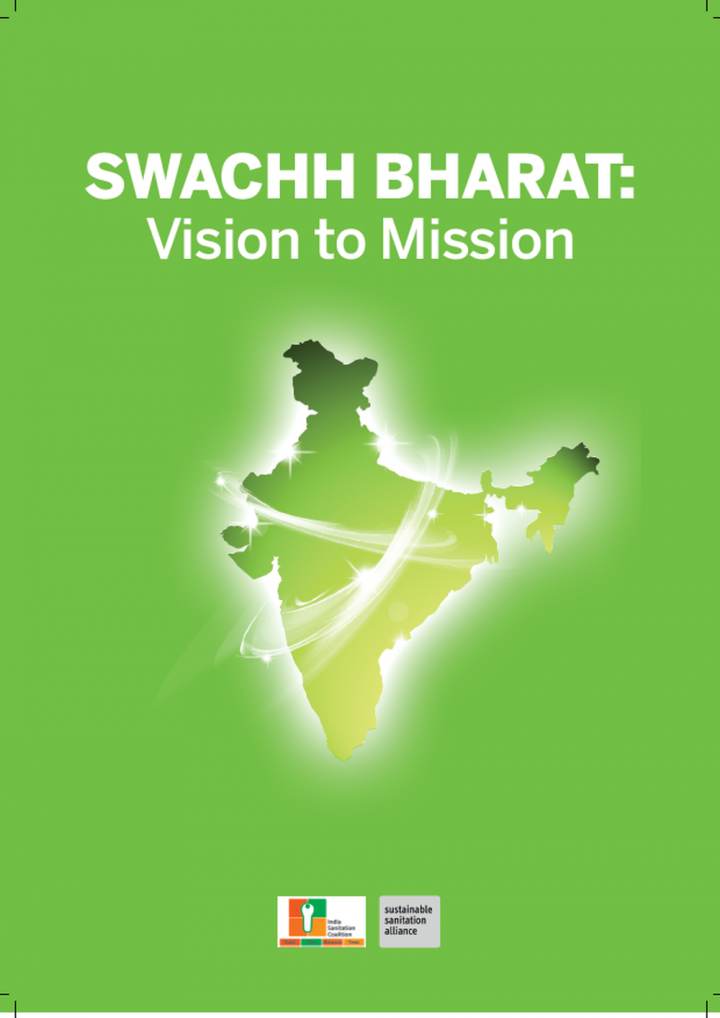Kampala Capital City Authority (2017) Community Sanitation Sensitisation Field Officer Information Toolkit
Toolkit on sensitising the community on safe management of faecal waste.
Beukes, L., Naidoo,D. (2015) Understanding and addressing the exposure of workers, the public and the environment to pathogens during pit emptying Water Research Commission Project 2134
On-site sanitation is a desirable option in many contexts and various on-site technologies have been rolled out in South Africa, as well as other countries, as a basic standard of adequate sanitation. Most on-site sanitation systems accumulate sludge in a collection chamber which eventually becomes full and needs to be emptied; the system can then be recommissioned for another cycle of use. If, in the process of emptying […]
World Health Organisation (2017) Water, sanitation and hygiene to combat neglected tropical diseases Initial lessons from project implementation
Water, sanitation and hygiene are essential for preventing and managing diseases including neglected tropical diseases which affect over 1 billion people among the poorest communities. Closer coordination of WASH and NTD programmes is needed to ensure WASH services are reaching the most vulnerable populations. Many WASH and NTD actors have started to work together on the planning and implementation of their projects and have documented […]
WHO (2015) Water sanitation and hygiene for accelerating and sustaining progress on neglected tropical diseases: A global strategy 2015-2020 (in English, French and Spanish)
Water, sanitation and hygiene (WASH) are critical in the prevention and care for all of the 17 neglected tropical diseases (NTDs) scheduled for intensified control or elimination by 2020. Provision of safe water, sanitation and hygiene is one of the five key interventions within the global NTD roadmap. Yet to date, the WASH component of the strategy has received little attention and the potential to link […]
Various authors (2017) 19th SanCoP meeting on Container Based Sanitation
The meeting's focus was to develop a shared understanding of the Container Based Sanitation (CBS) industry, to consider the use of Sanitation Safety Planning (SSP) to improve health outcomes, and to generate discussion and knowledge sharing to improve risk management in CBS.
WSUP / Light Castle Partners (2016) Local Business Development Support for Introducing Privatized Emptying Services to the Chittagong Market
WSUP’s (Water and Sanitation for the Urban Poor) project of “introducing privatized emptying services in Chittagong” is a scale-up of their previous project of public-private partnership for septic tank emptying services that began operations in Dhaka almost a year ago. The scale-up in Chittagong is targeting the procurement and implementation of two exhausting trucks via a sustainable business model. The current study is targeted at […]
Rahman N. (2016) SWEEP Rapid Market Assessment Dhaka, Bangladesh
Lerebours, A. (2016) Governance of Water and Sanitation As applied to humanitarian and development projects
This manual sets out to summarise Action contre la Faim s experience of water and sanitation governance, aided by invaluable contributions from a steering committee of governance experts. It was funded by the Action contre la Faim research foundation.
Chitty, A., Esteves Mills, J. (2015) WASH and Maternal and Newborn Health: Time to Act - Policy Brief
This policy brief documents the state of the evidence on how poor WASH impacts MNH and summarises SHARE's contribution to our understanding. It also highlights opportunities for future research and offers insights that could influence policy and improve programming in both sectors globally. In doing so, it offers a powerful argument in favour of using WASH to support efforts on MNH to leverage greater progress […]
Sykes, V., Chitty, A., Ensink, J., EstevesMills, J. (2015) Estimating the Potential Impact of Sanitary Child Stool Disposal Policy Brief
This policy brief highlights the often overlooked and enormous potential of hygienic child stool disposal to considerably reduce the prevalence of diarrhoeal diseases.It features new evidence on the determinants of child stool disposal and offers recommendations for the WASH and health sectors.
Gautam, O.P., EstevesMills, J., Chitty, A., Curtis, V. (2016) Complementary Food Hygiene Policy Brief An Overlooked Opportunity in the WASH, Nutrition and Health Sectors
This policy brief highlights the often overlooked opportunity that addressing complementary food hygiene offers the WASH, nutrition and health sectors for improving health outcomes. It outlines SHARE's contribution to narrowing the evidence gap concerning the relationship between food hygiene and child health, indicates opportunities for future research, and offers insights that could influence policy and improve programming in the WASH, nutrition and health sectors globally.
Chitty, A., Roma, E., Durrans, S. (2016) Process Evaluation of Tanzania’s National Sanitation Campaign Policy Brief
This policy brief summarises the process evaluation of Tanzania's National Sanitation Campaign (NSC). It highlights the key findings and proposes several recommendations for maximising the NSC’s effectiveness.
Balls, E. (2017) Menstrual Hygiene Management Policy Brief
This policy brief summarises previous research on MHM and highlights the SHARE Consortium’s contribution to this important topic. It then defines knowledge gaps which still exist and sets out clear recommendations for improving policy and programmes globally.
Durrans, S. (2017) Microfinance for Sanitation Policy Brief
This policy brief highlights the SHARE Consortium’s contribution to the knowledge base on microfinance for sanitation. The brief defines sanitation microfinance and summarises research conducted in India and Tanzania. It then discusses the research gaps that still exist and provides recommendations for improving policies and programmes on microfinance for sanitation globally.
Chitty, A., Wilson-Jones, M., Jones, D. (2016) The Missing Ingredients Are Policy-Makers Doing Enough on Water, Sanitation and Hygiene to End Malnutrition?
This report, conducted by SHARE and WaterAid, highlights why water, sanitation and hygiene are essential for nutrition. Through an analysis of national nutrition plans and policies in 13 countries, the research highlights the extent to which WASH is embedded at policy level and where and how improvements must be made.
Ulrich, L. (2012) Reportage photo sur la construction d’installations ecosan à Dayet Ifrah (in French) Photo report on the construction of ecosan facilities at Dayet Ifrah
French title: Reportage photo sur la construction d’installations ecosan à Dayet Ifrah
Owako, E., Kanga, S. (2017) Legislative and Institutional Summary of Sanitation in Kisumu, Kenya
The purpose of this study exercise is to identify and summarise the current national and county level sanitation situation in Kenya. This document will inform WSUP’s ongoing work in cities such as Kisumu, and will be used a basis for further analysis of Kenya’s sanitation legislation and institutional responsibilities and mandates.
Mills, J. E., Cumming, O. (2016) The Impact of WASH on Key Health & Social Outcomes Review of Evidence
This evidence paper looks at 10 areas identified collaboratively with the United Nations Children’s Fund (UNICEF) on which WASH can plausibly have a strong impact: diarrhoea, nutrition, complementary food hygiene, female psychosocial stress, violence, maternal and newborn health, menstrual hygiene management, school attendance, oral vaccine performance, and neglected tropical diseases.
India Sanitation Coalition (2017) Business of Change: Corporates in sanitation
This compendium is an initial collection of case studies on sanitation initiatives, and highlights how companies are engaging in the sector and supporting the Swachh Bharat Mission (SBM) launched by Prime Minister Modi. These interventions show how CSR spends are increasingly being used in sanitation. It is very encouraging to see how these companies have developed thoughtful projects to support disadvantaged communities, often evoking innovation. This […]
Jacob, N., Saxena, S., Shahpuri, A., Nath, V. (2017) Swachh Bharat: Vision to Mission
The India Sanitation Coalition (ISC) and Sustainable Sanitation Alliance (SuSanA) are pleased to present this report of the Swachh Bharat Mission (SBM), two and a half years after its launch. This document captures the ideas from ISC partner experiences, as well as e-discussions on the India Chapter of the SuSanA platform. It builds on these with secondary research to present the status of SBM in […]
